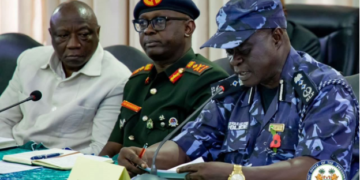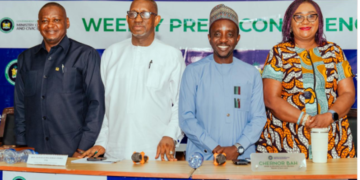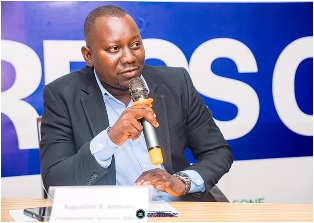By Hajaratu S. Bangura
The Ministry of Basic and Senior Secondary Education (MBSSE) has presented an analysis of the 2025 WASSCE results, outlining both the achievements and ongoing challenges.
The details were shared to the press by the ministry’s Communications Specialist, Augustine Bamie Anthony, on Tuesday, October 21, 2025, during the weekly government press conference at the Miatta Civic Centre.
He explained that this year’s results showed progress but also revealed critical areas that need attention.
Anthony explained that 148,313 candidates registered for the exams with results received for 97,817 and 13,237 withheld by WAEC due to exams issues while about 35,020 were absent.
He emphasized the importance of preventing multiple registrations, saying, “Going forward, we will be using National Identification Numbers to ensure no pupils register twice and to curb fraud.”
He disclosed the five top performers with Roseline Mariama Jalloh of the Modern Academy Senior Secondary School of Excellence scoring four 4 A1s, three B2s and two B3s – an average point of 1.78 – the overall best candidate for this year’s WASSCE.
Among the schools, Dele Peddle High School in Freetown stood out with a 100% pass rate for its 17 candidates. However, he clarified that “Just because a candidate comes first in the exam, does not mean that the candidate’s school also came first,” stressing the need for a broad approach to performance.

He explained that English remains a major challenge, with only 11.77% of candidates passing with credits. “Passing English has been a problem in all our public exams,” Anthony said.
He pointed out that failure to upload continuous assessment scores affected results which led to the suspension of several principals last year. “Some principals did not upload the continuous assessments and as a result, we had to suspend them because we believe that honest grading is key to our system.”
Anthony revealed that many pupils lack foundational reading skills, as investigations show that children in primary school cannot read at expected levels. “This learning poverty is a big issue and we need to focus on foundational literacy and numeracy,” he stated.
However, Mathematics showed better results with a pass rate of 47%. To fight examination malpractice, he explained that WAEC introduced a ‘serialization’ system which gives different exam versions in various regions. He stated that, “This pilot project aims to eliminate the 27,000 results that were withheld because of cheating, especially those involving identical answers shared on various WhatsApp groups.”
He said the ministry has established a committee comprising WAEC and civil society groups to review the results that were seized. “We are requiring evidence before results are canceled,” Anthony said. He added that plans are underway to review the WAEC Act to improve oversight and reduce malpractice, adding that the approval process is currently in progress.
Addressing issues of exams integrity, he said that the ministry has been vetting candidates to eliminate double registration. “We have checked the lists thoroughly and at the moment we have found 124,000 duplications. In the coming years, every student will have a unique NIN to prevent these issues,” he said.
He stated that overall education outcomes continue to improve compared to previous years: “NPSE pass rates increased from 78% to 81%, BECE from 72% to 96% and WASSCE from 18% to 52%.”
He added that the ministry is also recruiting more School Quality Assurance Officers, “Last year, we added 220 new staff to enhance monitoring across schools.”
He also expressed strong commitment to continuing reforms, saying, “Teachers are the quiet builders of our nation. We are working to support them, including plans for a national English subject teachers’ association to improve language teaching.”
He stressed that government remains dedicated to addressing foundational learning gaps, ensuring long-term growth and success for pupils across the country.

























